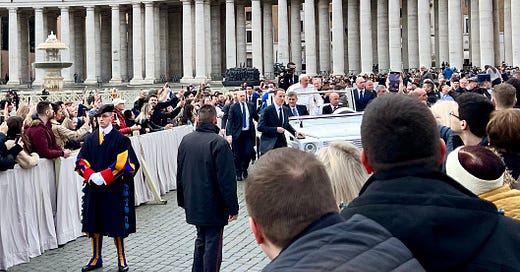One of the most surprising facts that people have learned about me is that, up until a handful of years ago, I went to church regularly. Catholic Church. And though that should come as no surprise, seeing as how I was raised in the South and fewer times are more sacred than Sunday mornings in church, the acknowledgement of me attending most Sundays out loud has quite literally stopped some people in their tracks.
“But, you’re…” they start to say, hesitating, looking for a sign on my face that I was only joking. I’ve heard the line so many times that I know exactly what they’re going to say. It’s predictable at this point. “Even though you’re gay? Really?”
Some have reaffirmed my attendance, if not cheekily poked fun at me. “Wow, good for you,” I heard once. Others have been less kind.
One former friend, upon me telling her, actually laughed in my face. “That’s a joke, right?” I won’t repeat the harsh, though likely true, things she said about the church, but the audible laugh was a new low, as if she thought me more educated but realized maybe I was too brainwashed to truly understand. We’re not friends anymore for different reasons, but I’d probably get no sympathy from her today.
Like most people, the first thing I did this morning when my alarm went off at 3 a.m. was check my phone. “Pope Francis dead at 88” read the first headline, sent the night before here in the Hawaii time zone. There are few days when it’s easy to get up this early and write. Your body has no desire, no matter how many hours you’ve slept, to break its cycle and wake in the middle of the night. But reading the headlines about the pope’s death sent a rush of energy through my system, along with accompanying emotions.
Two years ago I had the chance to stand just a handful of feet from Pope Francis as he circled St. Peter’s Square in Vatican City. On a vacation-turned-pseudo-pilgrimage that began in Rome and ended in Israel, I toured the Vatican and managed to snag a ticket that allowed me to attend the pope’s weekly audience. I will be forever grateful to the Swiss guard who gave me the ticket (one of whom is standing in the bottom left corner of the photo below).
Francis, riding around in the “pope mobile” that day, looked happy and blessed, if not a bit tired, to be outside with the people. I remember at one point thinking, “How am I actually this close to him right now?” The only thing that separated me from the man was a thin wooden barricade covered in white sheets (along with a dozen security personnel).
I understood almost nothing during the audience that day, as most of it was in Italian — some in Spanish — but it didn’t matter, because his presence was enough. After years of leading the church through progressive reform, attempting to bring to the modern era an institution often stuck in the past, he stood there in the square, welcoming everyone who took the time to visit. No matter the race, sex, age, or visual appearance, he welcomed without discrimination.
That, most of all, is what I will miss about him.
It’s difficult today to find many people who don’t discriminate for one thing or another. Ripped up clothing. A dangling rainbow earring. Black skin. Stunted growth. Missing limbs. The list could go on for pages. We’re all built differently, we all live different lives. I am just as guilty as others, judging some people based on their appearance. But Pope Francis did not, at least on the outside. He worked to include people, oftentimes to the detriment of his own influence. I will never forget the day he said on a plane to reporters, “Who am I to judge?” in response to a question about gay people in the church. Ultimately, not much came from that comment. It was more symbolic than anything, but it was a start. As Timothy Snyder, the famous historian and author, wrote this morning on his Substack: “Such symbols matter, because in them we can glimpse something higher through something human, something that remains even as the memory of white garments and golden artifice fades.”
Yes, it was often difficult to sit in mass as a child and later as an adult and hear the priest pontificate how wrong it was for some of us to live certain lifestyles. Providing something more than a symbol would’ve been appreciated. And yes, I’ve heard my fair share of feedback from those who attended Catholic school longer than me about how anti-gay the bible is and how I believe in a church that thinks I shouldn’t exist. But there is a growing population of Catholics who also believe in opening more doors to the church vice shutting all but a few. A more inclusive, welcoming church that believes in taking those symbols one step further, toward progress, toward change. That population had a voice in Pope Francis, and the world is a quieter place without him.
May his soul rest in peace.




